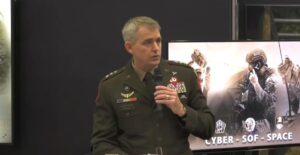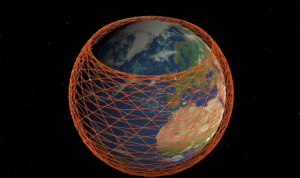Army officials on Tuesday told reporters they have seen more interest from allies and partner countries to learn techniques to resist occupation and use information warfare if invaded in the wake of Ukraine’s resistance to its invasion by Russia.
“I think one of the greatest lessons from the Ukraine wars has been the power of information ops, and influencing relevant populations in the world – has certainly rallied around Ukraine,” Lt. Gen. Jonathan Braga, U.S. Army Special Operations Forces commander, told reporters during a media roundtable at the AUSA 2022 conference on Oct. 11.

Braga compared Ukraine’s efforts, particularly by Ukraine president Volodymyr Zelenskyy, to those by U.K. World War II Prime Minister Winston Churchill, calling them “absolutely critical” to resistance beyond just a good operating concept.
“You can have a resistance operating concept. But if you don’t have the identity and will to resist as an identity, as a country and a sovereign nation, then you’re probably set up for failure to begin with. And the Ukrainians obviously had that. The amplification and achieving the delivery of information to influence relevant populations is key,” Braga continued.
Braga said now the existing operating concept is hugely important and influential internationally and the U.S. military has had “numerous countries” approach it to help develop their own post- Ukraine operating resistance concept, especially in both the European and Indo Pacific] theaters.
“There hasn’t been a special operations international military that I have not dealt with since the Ukraine crisis that has not talked to us about expanding information operations or psychological operations forces.”
Braga admitted some of his personal assumptions about how the Ukrainian conflict would go have proven wrong, particularly thinking the internet would not still be operational.
“I didn’t think the internet was going to be up this long, honestly. I had a false assumption there. And that being left open has left some opportunities for both internal and external messaging, I’d say that.”
Braga also outlined that the U.S. partnership with Ukraine on information operations has been strong.
“So the partnership has been strong, we do work together on supporting that conflict. I’m just leaving it at those general terms right now.”
Another official noted space-based communications have helped keep networks open for cyber operations.

“A piece too is just keeping the comms nets open. Look what Elon [Musk] was able to do with Starlink. So just being able to keep the comms open so the message could get out whether it’s cyberspace or whatever capacity or capabilities are out there…the information will get out there,” Lt. Gen. Daniel Karbler, Commanding General of U.S. Army Space and Missile Defense Command and Army Forces Strategic Command, added during the press event.
Starlink is a satellite constellation operated by SpaceX that provides satellite internet access.
Karbler noted this shows sometimes they just need to keep the content and networks open to let people in the conflict keep putting information out to the world. He also name-checked the influence of commercial satellite company Maxar Technologies Inc. [MAXR].
Braga underscored even if a country cannot afford to launch its own satellites, the “democratization where it’s becoming very accessible for all and that can actually provide capability in a unconventional warfare standpoint, where you might have a behind enemy lines situation where cyber and space might be able to actually deliver an effect or deliver information in denied physical areas.”
He said his command is in dialogue with various countries to this effect.
“Both countries that are well resourced and have a space program and some that don’t, but they’re still looking at how to leverage both cyber and space and the special operations forces.”
Separately, Braga said the U.S. has been helping Ukraine protect its military assets from Russian attacks.
“The key right now is obviously artillery and the different forms of artillery out there. I would say we’ve had a supporting role in working with some industry partners to provide some indicators and warnings to protect key assets of the Ukrainian military…. Something I’m proud about because it’s relatively quick, that’s probably the most impressive thing from me just watching both, again, combining what industry is providing, innovation mindset at the cutting edge of the battlefield, an understanding what the Ukrainian forces need.”
Braga said this includes counter-unmanned aerial systems (UAS) efforts as well.